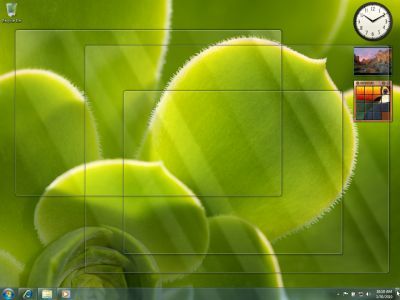Windows 7 to salvage Vista "train wreck"

Your support helps us to tell the story
From reproductive rights to climate change to Big Tech, The Independent is on the ground when the story is developing. Whether it's investigating the financials of Elon Musk's pro-Trump PAC or producing our latest documentary, 'The A Word', which shines a light on the American women fighting for reproductive rights, we know how important it is to parse out the facts from the messaging.
At such a critical moment in US history, we need reporters on the ground. Your donation allows us to keep sending journalists to speak to both sides of the story.
The Independent is trusted by Americans across the entire political spectrum. And unlike many other quality news outlets, we choose not to lock Americans out of our reporting and analysis with paywalls. We believe quality journalism should be available to everyone, paid for by those who can afford it.
Your support makes all the difference.Microsoft releases Windows 7 to the world on Thursday as the US software giant tries to regain its stride after an embarrassing stumble with the previous generation operating system Vista.
"It's a big deal for Microsoft," analyst Rob Enderle of Enderle Group in Silicon Valley said of the Windows 7 launch. "Windows Vista was a train wreck."
While computer users may not give much thought to operating systems that serve as the brains of their machines, the programs are at the heart of Microsoft's global software empire.
Microsoft operating systems run more than 90 percent of the computers on Earth.
Importantly for Microsoft, versions of its popular programs such as Office, Outlook and Excel evolve to work better with successive Windows releases.
Winning users of new Windows systems translates into increased sales of other packaged software for the Redmond, Washington-based company.
Vista's dismal reception in the market broke Microsoft's rhythm regarding hooking people on upgraded software.
Computer users held firm to Windows XP, shunning much-maligned Vista.
"Microsoft is still a packaged software company," Enderle said. "If people don't buy their updated packages, they feel it."
Microsoft apparently learned a lesson from Vista and worked closely with computer makers, users and software developers while crafting Windows 7.
More than eight million people have dabbled with Windows 7 since Microsoft began a beta test phase in January, according to Parri Munsell, director of consumer product management for the Windows client group.
Early reviews praise Windows 7 for being everything Vista should have been.
"We always listen to our customers, but we took an even more thoughtful and pragmatic process this time around," Munsell told AFP. "We feel really good that people have been trying it for themselves."
Windows 7 features winning raves include enabling computers, televisions, radios, digital picture frames and other "smart" devices in homes to talk to each other.
Windows 7 also lets people use PCs to record television programs and then watch shows "on demand" at any Internet-linked computer using Microsoft's Live service.
Touch-screen capabilities built into Windows 7 should give birth to monitors that further blur lines between televisions and PCs, according to Munsell.
Microsoft's primary objective with Windows 7 was to simplify the lives of PC users, according to Munsell.
"This is going to be the next XP where it sticks around for a very long time," said analyst Matt Rosoff of Directions On Microsoft, a private firm focused on tracking the software firm.
"It performs well with a lot of hardware and software, and then it gets out of the way. It is not flashy, but it is solid."
He added that Windows 7 works "surprisingly well" on netbooks -- low-cost bare-bones laptop computers that have devoured market share in the recent grim economic times.
Windows 7 will be available pre-loaded on personal computers as of Thursday, and people who bought Vista machines in recent months will be able to upgrade free.
Upgrading a home computer to Windows 7 will cost from 120 dollars to 220 dollars, depending on the version.
As well-built as Windows 7 is, it probably won't boost consumer PC purchases, which depend heavily on the economy, according to Rosoff.
A lot of corporations clinging to Windows XP are expected to upgrade to Windows 7, but after Microsoft's new Office 2010 suite of business applications is released next year.
"This kind of gets Microsoft back on track with its core business," Rosoff said. "It is not going to be something that takes the world by storm, but it is a solid operating system that people will be relying on for years."
The failure of Vista to catch on hurt Microsoft competitively, giving Apple the opportunity to woo PC users to Macintosh computers.
Apple could benefit anew if PC users faced with switching operating systems go for Macintosh machines instead of Windows 7, according to analysts.
Microsoft has been faulted in the past for lacking the type of marketing pizzazz for which longtime rival Apple is famous. Microsoft has devoted an ample budget to advertising Windows 7.
Microsoft has already been lambasted for hokey online videos describing how people can throw Windows 7 launch parties in their homes.
Microsoft and television studio Fox announced that Windows 7 will be the theme of an animated "Family Guy" television show featuring "musical numbers, comedy sketches, and celebrity guests."
"The fact that Microsoft is trying new things is actually pretty unique," Enderle said. "They are going to try to show that Microsoft and innovative marketing is not an oxymoron."
Join our commenting forum
Join thought-provoking conversations, follow other Independent readers and see their replies
Comments